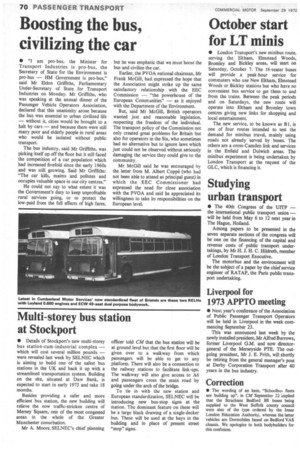Boosting the bus, civilizing the car
Page 352

If you've noticed an error in this article please click here to report it so we can fix it.
• "I am pro-bus, the Minister for Transport Industries is pro-bus, the Secretary of State for the Environment is pro-bus — HM Government is pro-bus," said Mr Eldon Griffiths, Parliamentary Under-Secretary of State for Transport Industries on Monday. Mr Griffiths, who was speaking at the annual dinner of the Passenger Vehicle Operators Association, declared that this unanimity arose because the bus was essential to urban civilized life — without it, cities would be brought to a halt by cars — and because there were still many poor and elderly people in rural areas who would be isolated without public transport.
The bus industry, said Mr Griffiths, was picking itself up off the floor but it still faced the competition of a car population which had increased fivefold since the early 1960s and was still growing. Said Mr Griffiths: "The car kills, maims and pollutes and occupies valuable space in our city centres."
He could not say to what extent it was the Government's duty to keep unprofitable rural services going, or to protect the low-paid from the full effects of high fares, but he was emphatic that we must boost the bus and civilize the car.
Earlier, the PVOA national chairman, Mr Frank McGill, had expressed the hope that the Association might strike up the same satisfactory relationship with the EEC Commission — "the powerhouse of the European Communities" — as it enjoyed with the Department of the Environment.
But, said Mr McGill, British operators wanted just and reasonable legislation, respecting the freedom of the individual. The transport policy of the Commission not only created great problems for Britain but also for operators in the Six, who sometimes had no alternative but to ignore laws which just could not be observed without seriously damaging the service they could give to the community.
Mr McGill said he was encouraged by the letter from M. Albert Coppe (who had not been able to attend as principal guest) in which the EEC Commissioner had expressed the need for close association with the PVOA and said he appreciated its willingness to take its responsibilities on the European level.
































































































































































































































































































































































































































































































































